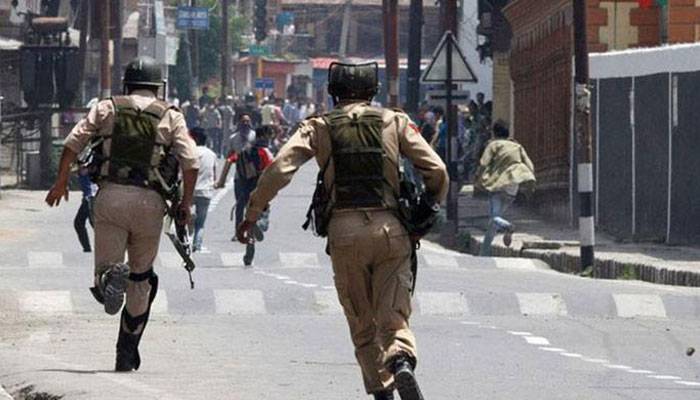Revelations by new UN report on Kashmir
Shares

The UN High Commissioner for Human Rights (OHCHR), on July 8, 2019, released a 43-page report that raises serious concerns about abuses by state security forces and armed groups in Indian held parts of Kashmir. The Indian government dismissed the report as a “false and motivated narrative” that ignored “the core issue of cross-border terrorism.” Pakistan welcomed the report but requested that sections be removed or amended in which the information was “not specific to Pakistan-Administered Kashmir but were general human rights concerns affecting all of Pakistan.”
The report says the number of civilian casualties reported in Indian occupied Kashmir (over the 12-month period) may be the highest in more than a decade. The new report describes how tensions over Kashmir rose sharply after a deadly suicide bombing in February targeting Indian security forces in Pulwama. It states that the strained relations between Pakistan and India continue to have a severe impact on the human rights of civilians, including the right to life. It calls on the 47-member state UN Human Rights Council to “consider the possible establishment of a commission of inquiry to conduct comprehensive independent international investigations into allegations of human rights violations in Kashmir.”
Some relevant points of the report are:
• 160 civilians were killed in IoK in 2018 (believed to be the highest number in over a decade). The last year also registered highest number of casualties in IoK (159 Indian security forces personnel and 267 armed groups -- totaling a figure of 588). The report notes that the Indian Ministry for Home Affairs published lower casualty figures, citing 37 civilians, 238 militants and 86 security forces personnel killed.
• Of the 160 civilian casualties reported by local organizations in IoK: 71 were killed by Indian security forces, 43 by alleged members of armed groups or by unidentified gunmen, 29 were reportedly killed due to shelling and firing by Pakistani troops in areas along the Line of Control, 35 civilians were killed and 135 injured on the Pakistan side of the Line of Control due to shelling and firing by Indian forces during 2018.
• Accountability for violations committed by members of the Indian security forces remains virtually non-existent. It claims no information about any new investigation into excessive use of force by Indian security forces. There is no information on the status of the five investigations launched into extrajudicial executions in 2016.
• IoK did not establish any investigations into civilian killings in 2017. No prosecutions have been reported and it does not appear that Indian security forces have been asked to re-evaluate or change their crowd-control techniques or rules of engagement.
• Arbitrary detention and so-called “cordon and search operations” leading to a range of human rights violations, continue to be deeply problematic, as do the special legal regimes.
• The Armed Forces Special Powers Act 1990 (AFSPA) remains a key obstacle to accountability. The Section 7 of the AFSPA prohibits the prosecution of security forces personnel unless the Government of India grants a prior permission or ‘sanction’ to prosecute. In nearly three decades there has not been a single prosecution of armed forces personnel granted by the central government.
• The Indian Army has also been resisting efforts to release details of trials conducted by military courts where soldiers were initially found guilty but later acquitted and released by a higher military tribunal. No Indian security forces personnel accused of torture or other forms of degrading and inhuman treatment have been prosecuted in a civilian court since these allegations started emerging in the early 1990s.
• Despite international concerns at the alarming numbers of deaths and life-altering injuries caused by the Indian security forces, regular use of shotguns as a means of crowd control (even though they are not deployed elsewhere in India) continue to be employed.
• A 19-month-old girl was hit by metal shotgun pellets in her right eye on 25 November 2018. A total of 1,253 people have been blinded by the metal pellets used by Indian security forces from mid-2016 to end of 2018.
The UN human rights office also said that India should amend its Public Safety Act that allows detention without charge or trial for up to two years. The law has been used to detain protesters, political dissidents, and other activists on vague grounds for long periods, ignoring regular criminal justice safeguards. In July 2018, the Indian occupied state government of Jammu and Kashmir amended Section 10 of the Public Safety Act, removing the prohibition on detaining permanent residents of Jammu and Kashmir outside the state.
At least 40 people, mainly separatist political leaders, were transferred to prisons outside the state in 2018, the OHCHR said. It said that transferring detainees outside the state makes it harder for family members to visit and for legal counsel to meet with them. It also noted that prisons outside the state were considered hostile for Kashmiri Muslim detainees, especially separatist leaders.
Understandably, India slammed the UN report and claimed that its findings differed from the UN Security Council's earlier position of condemning the role of Pakistan in the Pulwama terror attack. New Delhi called the report "a continuation of the earlier false and motivated narrative" and has asserted that the claims made by the UN body are "in violation of India's sovereignty and territorial integrity".
